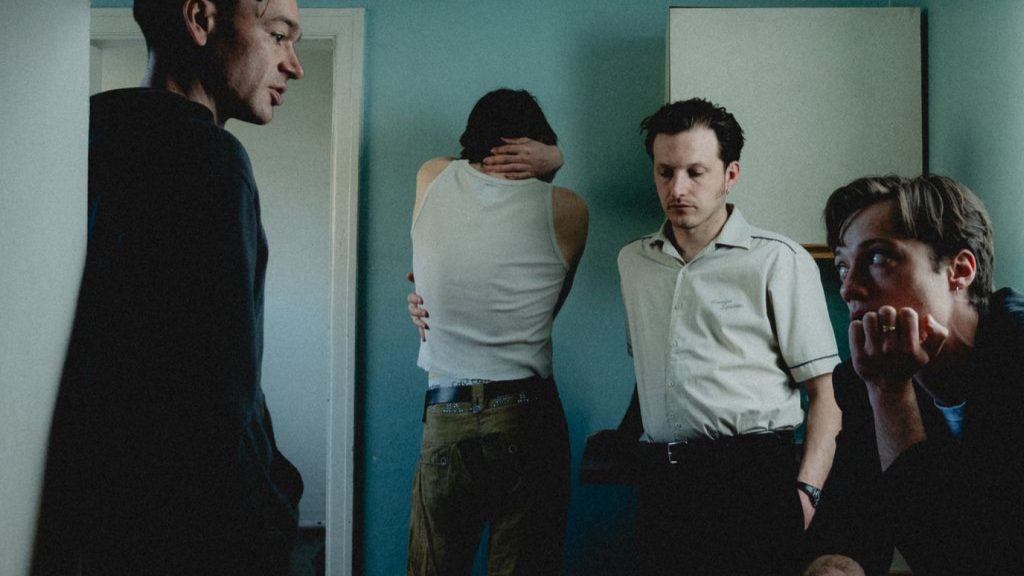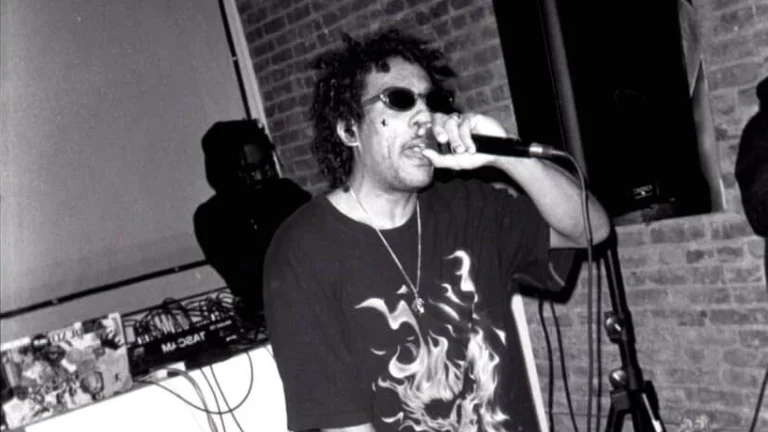Every representation is necessarily and inevitably partial. Yet we still swoon at the sensual quality of physical culture: film, where light rays touch a memory keeping it alive in a trace of material touching between photons and the screen inside a camera, and vinyl, which holds the actual soundwaves from an old artist rather than a series of translatable ones and zeros. It might be cropped, but some of what’s real is there. Legss’ debut album Unreal deals with just that, the partially recorded, as well as the sometimes misunderstood habits of modern life. It is just as sexy as a Gainsbourg album picked up at a carboot sale, except it deals in “Bit Rot” and goblin mode. Less romantic, more utilitarian, but nonetheless influenced by the greats.
Legss’ top crooner Ned Green and guitar strummer Max Oliver each call in on a Thursday evening in August from respective austere white walled office corner and homely kitchen table, the former drinking liquorice tea. “Oh, that sounds horrible,” protests Oliver, the latter drinking a pint of water in a Guinness glass, smoking straights. Attempting to set the scene, we imagine meeting at the pub, since it’s prime post-work drinks time and the album is littered with references to booze and hangovers. Oliver shares he’d be drinking a real Guinness, his choice earlier this week after returning from a holiday in Paris, straight to a friend’s gig in Camberwell, London. Seven years into finding themselves as the much-loved riotous South London band, Legss deliver a hedonistic release, both complex and silly. There’s the muttered lyric on “American Flowers,” “If they say it’s bad then it must be gospel,” which is a joke reflecting on widespread cultural critique and the shout on “909,” “It’s like being a fox and having all these dickheads shooting at ya,” some people’s weekend leisure. However, their intellectual side—name-dropped by Simon Reynolds in a Mark Fisher book afterword—and literary presence—Toothgrinder Press—is hard to ignore.
Potentially due to lack of funds as an unsigned band’s self-release, Unreal oozes daring lyricism, horns and strings alongside honed down clashing textures. The lyric from “Local God,” a successful early track from the band, “freelancers who can’t afford to drink like they did” is echoed in mentions of fine wine, coffee addiction, and hangovers. Day-to-day habits are embedded throughout Green’s lyricism—and the analogue photographic album artwork—that continues to observe “mundane, habitual practices” and “commonplace ritual,” as he and Oliver put it, through an uncanny lens.
When we last spoke in 2021, the band joked their future plan was to write their own “Girls & Boys,” the Britpop hit by Blur, perhaps ready to step out of the fringe. Unreal is a definite step towards that center with smoother melodies. Oliver explains, “We are incrementally, over a very long time now, inching ourselves towards a reincarnation of Britpop,” smiling, eyes full of light and mischief, “It’s definitely the poppiest thing we’ve ever done. There are songs now in major keys, things are less jarring, more anthemic—more euphoric even—or at least for us when writing them and playing them.” For example, “See No Evil” dances in major key, verging on Dexy’s Midnight Runners if the lyricist was exhausted. Whereas “Bit Rot” and “Gloss” no, but they still feel flirty—gravelly whispered lyrics from Green, egged on by producer Balázs Altsach à la Frank Sinatra and Billie Holiday. This sexy fifties-inspired vocal, the push, projected take, and draw, breathy one underneath it, thump up against the perfect weirdness of explosive or woozy instrumentation, splintering the listening pleasure in many directions while touching on the everyday musical theme of romance.
When we can get our head above the water of Legss’ crushing rhythm section and see these tracks as bangers rather than an experimental tide to swim against, Oliver’s response to questioning on Brit Pop rings true: “I guess Britpop is all about that sort of carefree attitude. It’s about celebrating everything, not so much a reflection, just living in the moment. Maybe there are pieces of that within this record, certainly more so than there has been before.” Their back catalogue is primarily dark and anxiety-inducing, and this album keeps that up, with a sprinkling of peace. “Bit Rot,” while in the vein of other critical releases like “Writhing Comedy,” is not so depressed, with warmer production, matching the hot vocals for a thick, smoggy ambience like a sweaty day where you can’t breathe right or you’re transfixed by the news—something that will happen over and over again. Through it, a lilting rhythm like a sort of sonic limp shares the perfect imperfection of Britpop.
Interrogation of information transmission is an ongoing, albeit unintentional theme in Legss’ music—from the latest tracks “Broadcast” and “909” (the FM for BBC Radio 5) to Doomswayers’ “Letter to Huw” (Huw Stephens, the broadcaster). The partial nature of reporting is highlighted with the screamed lyrics, “It’s your views, it’s your calls,” on unravelling, choppy “909.” Radio, or at least podcasts, is a huge part of daily routine. Green pronounces over our call, “I’m a big radio-head, but I hate Radiohead.” Mention, however, of the iconic British film “The Boat That Rocked” [US title “Pirate Radio”] brings a smile to the faces of Green and Oliver, specifically keen on the soundtrack following Pirate radio DJs playing vinyl. They explain together, “It’s like the Legss tour soundtrack. It has soundtracked a few really amazing moments. One time in particular, we were off to play a festival in the Netherlands, and we were running desperately late, and we had minutes to make the boat, and the car door wouldn’t close.” Fittingly dramatic, they continue, “We were going down the motorway, and I [Oliver] was holding it with my fingertips, and it was shaking, and I think it was Duffy’s cover, and it reached the climax of the song, and we turned a corner, and the lights of the ferry port appeared, vocals opened up. It was incredible. It was, ‘Stay with me baby’ (bursting into jagged song together). Just the last car on. It was unreal.” This sense of relief comes by in part on the gentle sway of “Eversince,” and celebration is reserved for being twisted like their only-ever-performed-live “Blue Christmas” cover, which draws out the lyric blue, hammering on the first note of every bar, insisting to not conform.
When trying to describe Legss’ Unreal, Goblin mode is supposedly “bang on,” a very online word they accept despite their dislike for social media. It sums up the interactions the band has musically—with crazed, angular sonic features—and as friends messing around. Oliver laughs, “Goblin mode is going feral, a bit unhinged, loose. Becoming increasingly delirious in the car, now van, on tour we inhabit different characters to entertain each-other,” adding, “How we produce the music… we don’t have classical or traditional musical backgrounds, we will just hammer away at things from bizarre angles that appeal to us because they’re funny or interesting or catch us off guard, and so that’s a feral attitude to creating art or music.” Crashing instruments come together with impulsive excellence. Their “different characters” are opaque and surprising, and do not appear on the album itself but are part of the playfulness amongst the band, “more suited to children’s television” they giggle. Green admits, “I don’t think that’s unique to us, though, going stir crazy in a band with all your friends. Louis [Grace] has got that one where he’s sort of an orc off The Lord of the Rings and saliva just goes everywhere,” he says emphatically. Willfully strange, in a world of their own, Legss’ fearless desire to create is unstoppable. The album’s final track is a lyricless ancient pump organ outro, with the title meaning a contrapuntal short melody with interweaving parts and the psychological loss of awareness of identity associated with hysteria. Ready to be a little untethered from normality is where this alt-rock triumphs.





